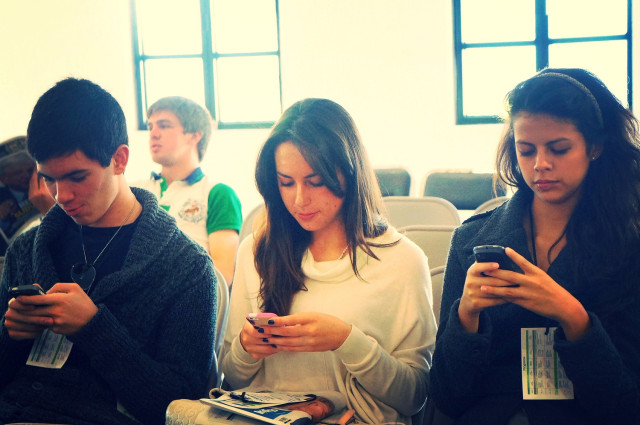

It’s awfully quiet with our heads all down. Photo: Esther Vargas
Last week, I had a very long conversation with a woman who specializes in them: Sherry Turkle. The clinical psychologist, scholar and author of Reclaiming Conversation has some pretty alarming anecdotes about the ways our smartphones have affected the time we spend face-to-face with each other, based upon hours of interviews with students, CEOs, singles, and parents.
We have all experienced this, or done this ourselves—turn down to look at our phone and respond to a text mid-conversation with the person in front of us, whether that person is our co-worker, our kid, our partner. And we’ve all been on the other end of the compromised conversation too, biding our time until we have our companion’s attention back.
“The main thing that our phones do that I’m sure of, that I just want to draw everybody’s attention to,” Turkle said during our interview, “is that when you’re with your friend and your put up your hand and you turn away to look at your phone, that is a unique gesture, and we will not as a culture, it’s as though we simply will not acknowledge how psychologically powerful that is.
That’s really, amazingly powerful to say, ‘I’m putting you on hold, while I do my other thing. I’m turning to my friends on the phone.’ And we need to get a little more real about what we’re saying to our friends when we’re doing that.”
We spoke mainly of how our phones are diverting parents’ attention away from our kids. In her book however, she details how this curtailment of conversation manifests itself in other settings. In schools, she cites examples of children who cannot socialize or empathize as kids did a generation ago. In college and the workforce, she describes how students and colleagues find it hard to connect with or speak to one another in person. In relationships, couples fight, and singles flirt (and sometimes break things off) exclusively over text.
It’s easy to question the book’s assertions, to rationalize that the people Turkle interviewed do not represent all of humanity—or at least the smartphone-owning public—and that the impact of our phone use is negligible when you consider all it’s allowed us to do. For those who are wary of the way it takes us away from the people in front of us, it’s a welcome reminder to stay present.
The full interview is on Screen Time Social, the event page for an expo Brooklyn Based Kids is producing on February 28 at the Museum of Jewish Heritage.

